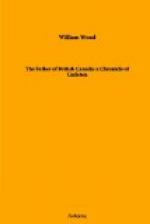A few days later Arnold was trying to get a colonelcy from the Convention of New York, whose members just then happened to be thinking of giving commissions to his rivals, the leaders of the Green Mountain Boys, while, to make the complication quite complete, these Boys themselves had every intention of electing officers on their own account. In the meantime Connecticut, determined not to be forestalled by either friend or foe, ordered a thousand men to Ticonderoga and commissioned a general called Wooster to command them. Thus early were sown the seeds of those dissensions between Congress troops and Colony troops which nearly drove Washington mad.
Schuyler reached Ticonderoga in mid-July and assumed his position as Congressional commander-in-chief. Unfortunately for the good of the service he had only a few hundred men with him; so Wooster, who had a thousand, thought himself the bigger general of the two. The Connecticut men followed Wooster’s lead by jeering at Schuyler’s men from New York; while the Vermonters added to the confusion by electing Seth Warner instead of Ethan Allen. In mid-August a second Congressional general arrived, making three generals and half a dozen colonels for less than fifteen hundred troops. This third general was Richard Montgomery, an ardent rebel of thirty-eight, who had been a captain in the British Army. He had sold his commission, bought an estate on the Hudson, and married a daughter of the Livingstons. The Livingstons headed the Anglo-American revolutionists in the colony of New York as the Schuylers headed the Knickerbocker Dutch. One of them was very active on the rebel side in Montreal and was soon to take the field at the head of the American ‘patriots’ in Canada. Montgomery was brother to the Captain Montgomery of the 43rd who was the only British officer to disgrace himself during Wolfe’s Quebec campaign, which he did by murdering his French-Canadian prisoners at Chateau Richer because they had fought disguised as Indians. [Footnote: See The Passing of New France, p. 118.] Richard Montgomery was a much better man than his savage brother; though, as the sequel proves, he was by no means the perfect hero his American admirers would have the world believe. His great value at Ticonderoga was his professional knowledge and his ardour in the cause he had espoused. His presence ’changed the spirit of the camp.’ It sadly needed change. ’Such a set of pusillanimous wretches never were collected’ is his own description in a despairing letter to his wife. The ‘army,’ in fact, was all parts and no whole, and all the parts were mere untrained militia. Moreover, the spirit of the ‘town meeting’ ruled the camp. Even a battery could not be moved without consulting a council of war. Schuyler, though far more phlegmatic than Montgomery, agreed with him heartily about this and many other exasperating points. ’If Job had been a general in my situation, his memory had not been so famous for patience.’




